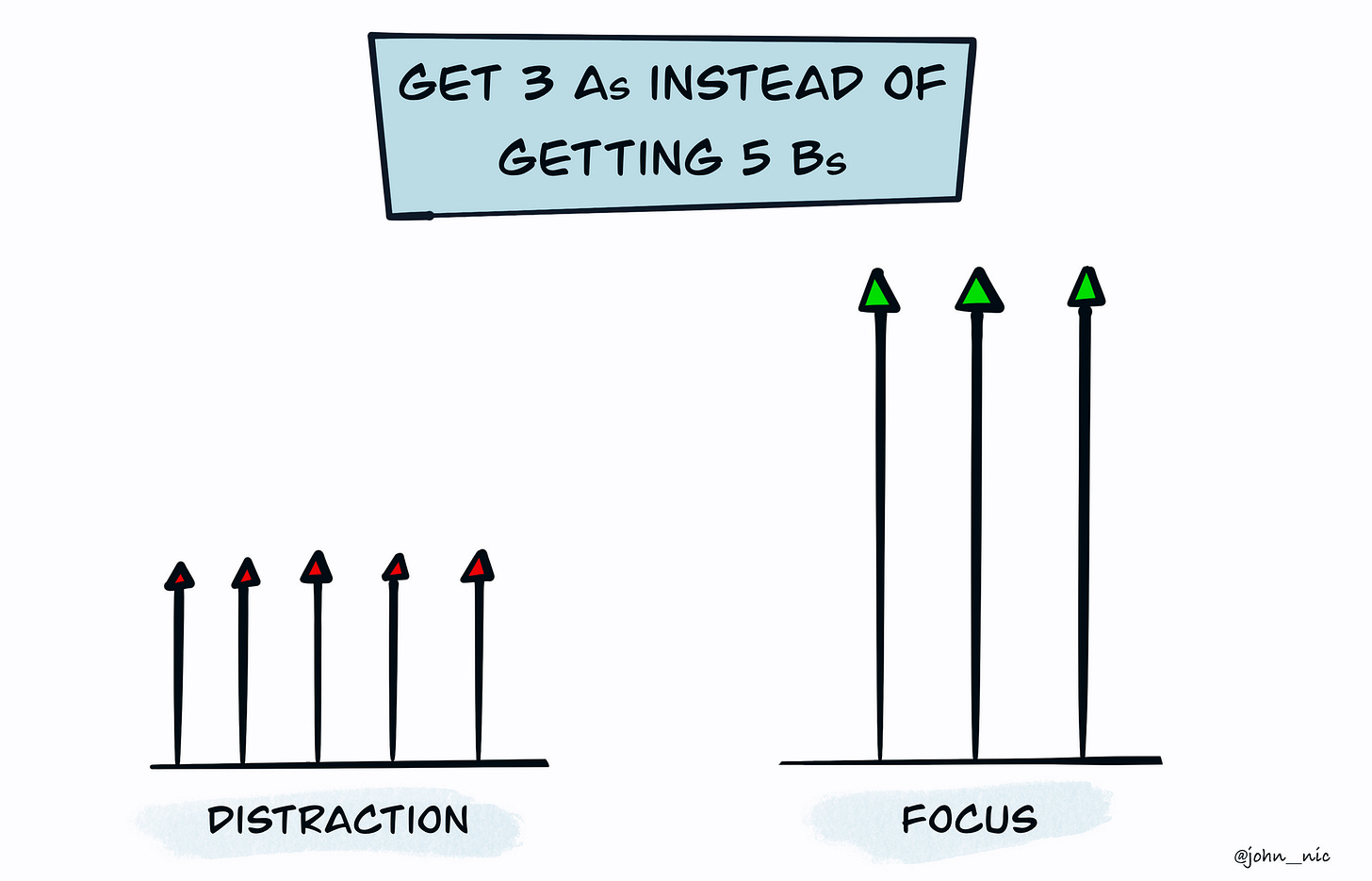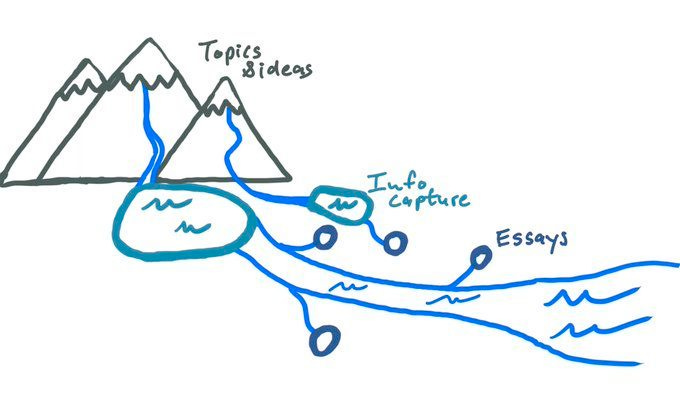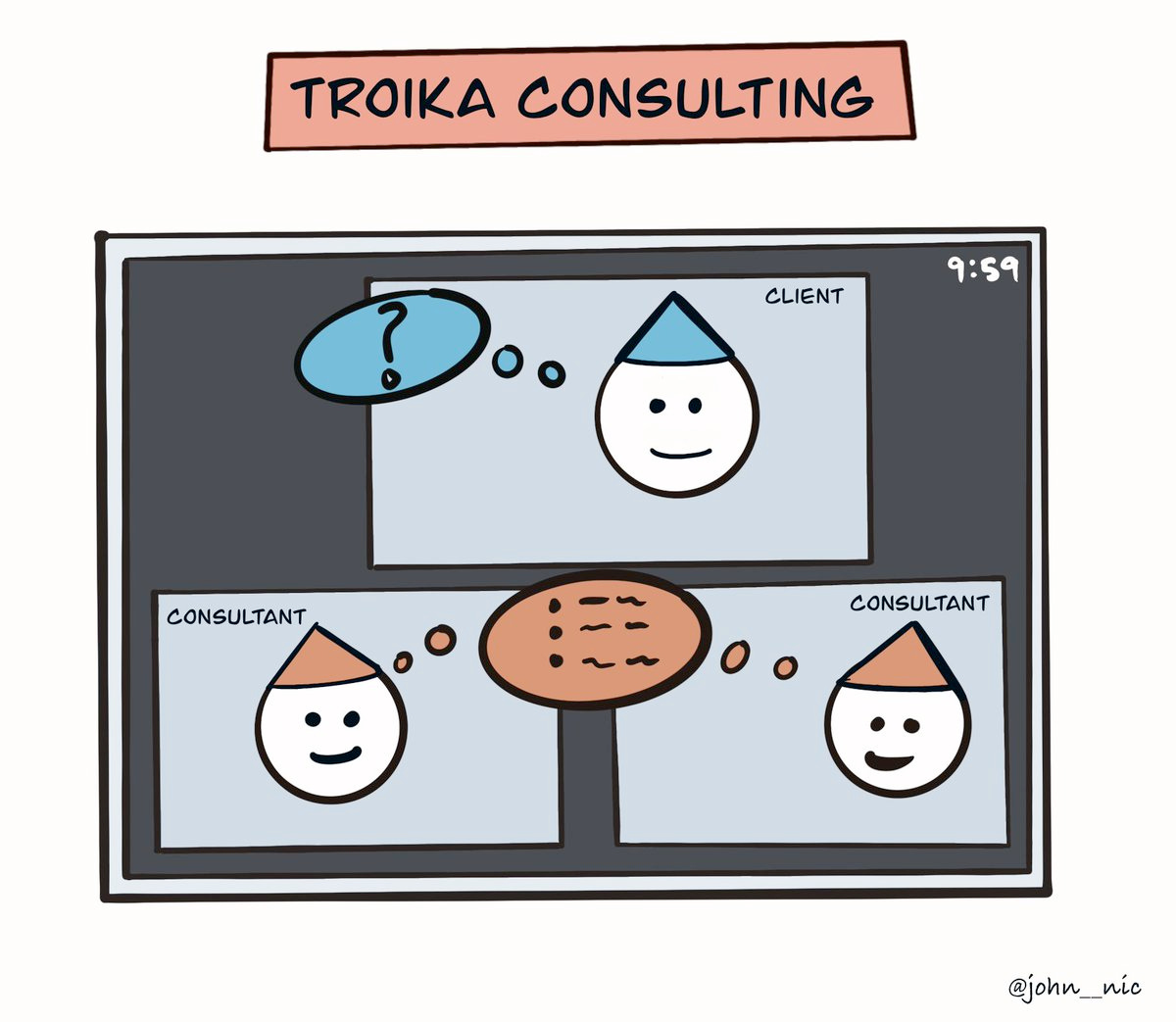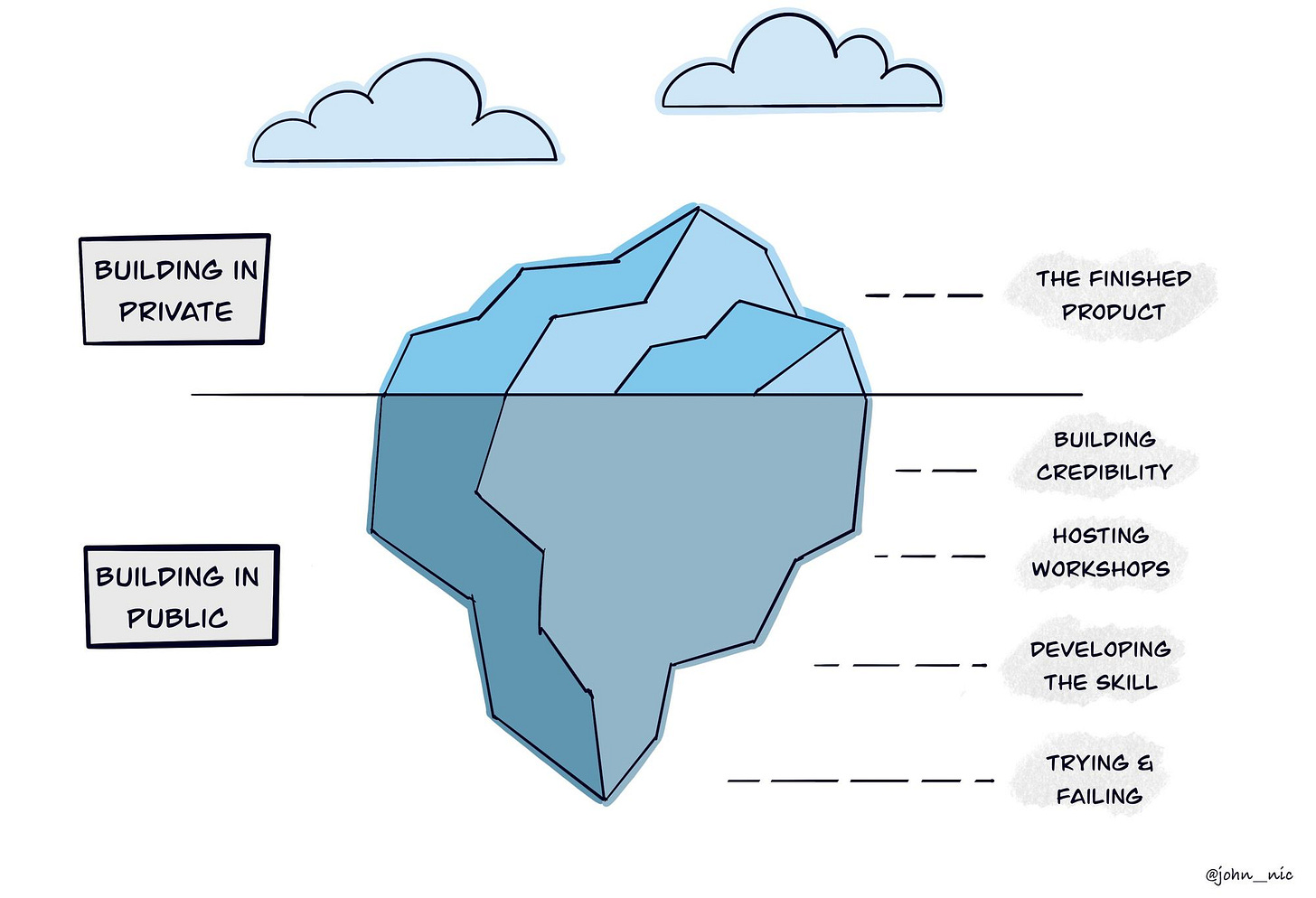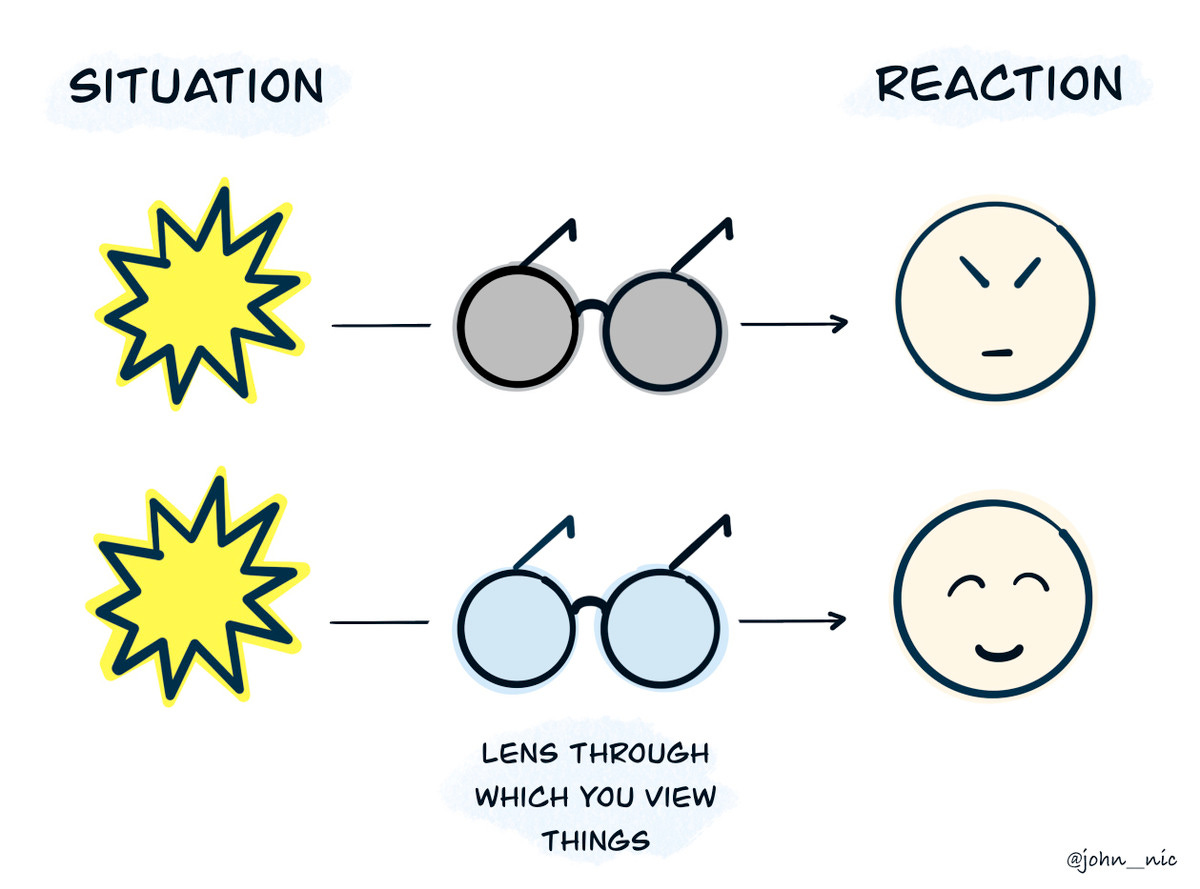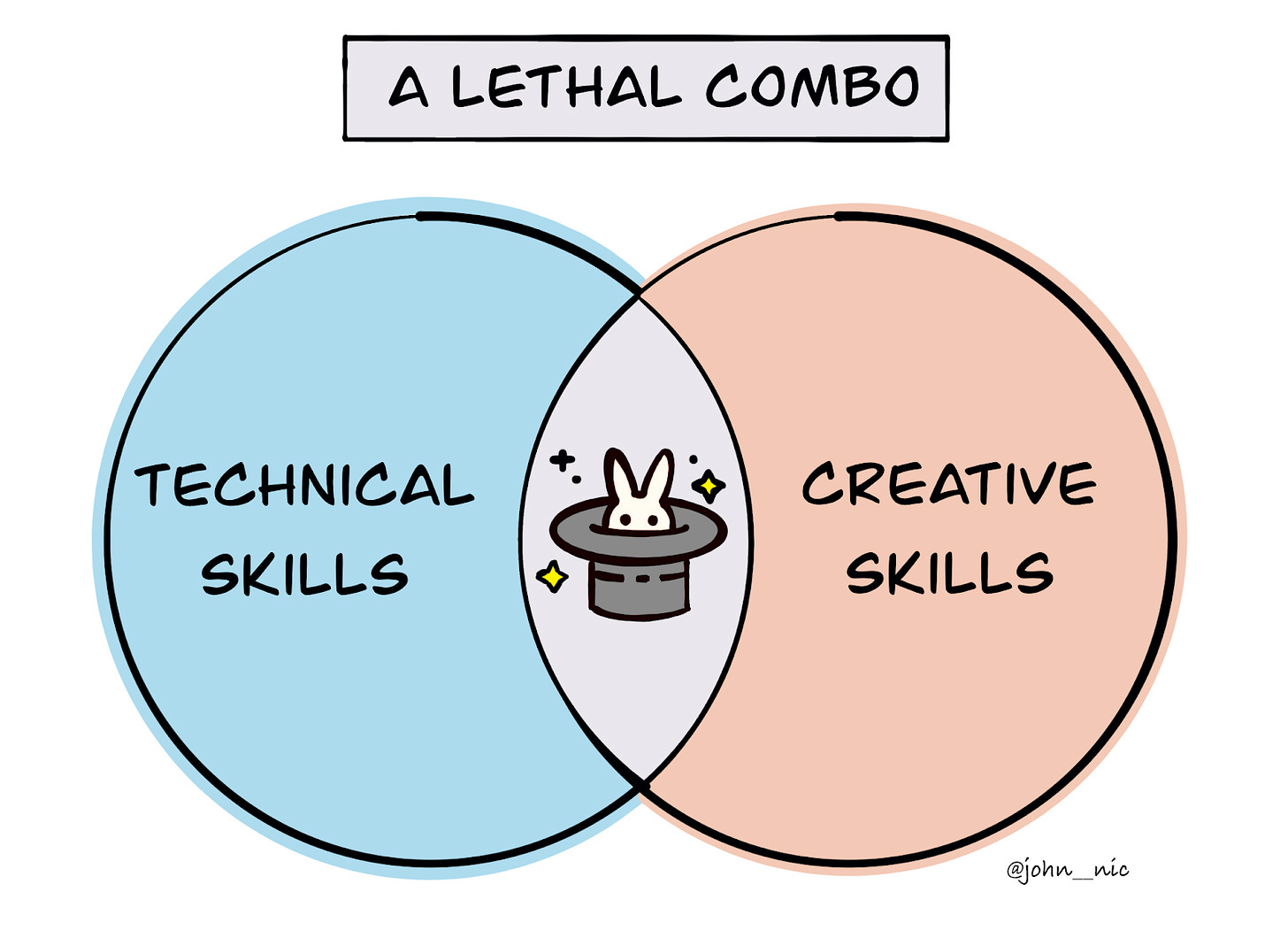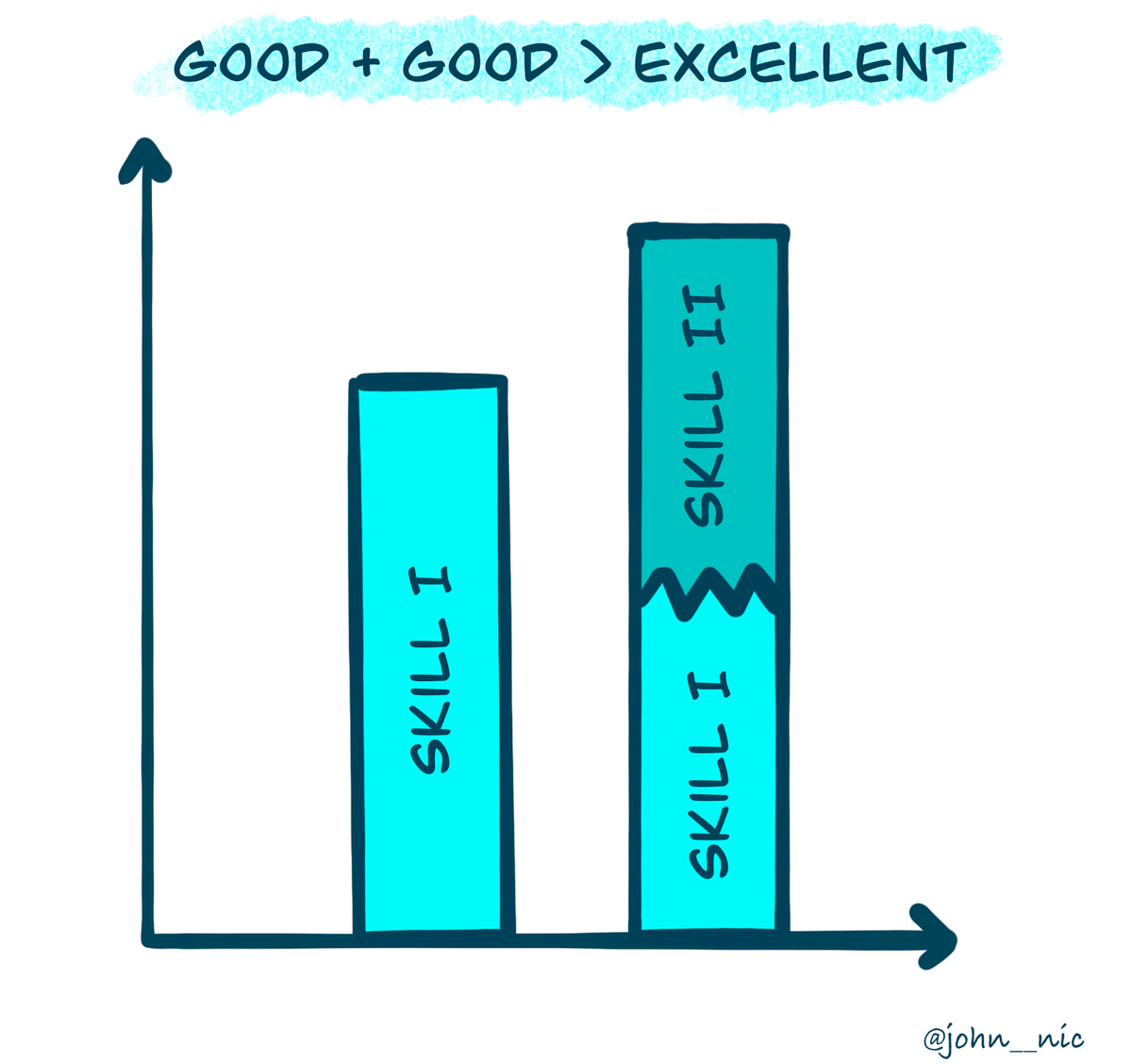Visuals
A collection of my illustrations
1. Learn from your peers
Learn from those a few steps ahead of you and teach those a few steps behind you.
"It's almost always better to learn from peers who are 2 years ahead of you than mentors who are 20 years ahead of you. Life evolves and most insights get outdated." - James Clear
2. Do the work, then make some noise
Doing great work is only half the job.
If you want to increase your chances of success (your luck), you need to tell people about your work as well. This is something I’ve learned the hard way.
“The amount of luck that you have in life is how much value you create, times how many people you tell about it.” — Patrick McKenzie
3. Teaching is the ultimate form of learning
If you want to deepen your understanding, explain your process to others.
For as Einstein says:
"If you can't explain it simply, you don't understand it well enough."
4. Set your priorities
In 2008, Matthew McConaughey shut down his film production company and his record label.
"I was making B’s in 5 things. I want to make A's in three things."
He realized we can do many things, but we can't do everything. Only some things really matter.
Saying no to the things that don't matter has a double benefit:
You no longer have to do the unimportant things.
You can do the important things better by going all in.
5. Create leverage
Set up systems for repeatable processes.
Spend time working ON the machine, not just IN the machine:
6. Don't create, document
You do not have to be super creative to be a writer.
Instead of searching for inspiration, look at the content you’re already consuming – the books you're reading and the podcasts you're listening to. Look at the things you're already doing – your work and your habits.
Instead of looking for inspiration to hit me like a lightning bolt, I wrote a number of essays simply by documenting my process.
7. Switch off to switch on
In our quiet moments, our best ideas often bubble up.
Build in moments of silence in your life. For me, this comes down to not plugging in my headphones when I go for a walk. Not always looking at emails and notifications. Not always being connected.
"The secret to doing good research is always to be a little underemployed. You waste years by not being able to waste hours.” – Amos Tversky
8. Negative Visualization
When you imagine losing something you take for granted (e.g. your health), you will appreciate it more. It will make you want the things you already have.
“The easiest way for us to gain happiness is to learn how to want the things we already have.” ― William B. Irvine
9. The Power of Anti-goals
By defining what you are scared of becoming, you get closer to figuring out what you stand for. By pointing out what you want to avoid, you get closer to where you want to go.
"People focus on role models; it is more effective to find antimodels - people you don't want to resemble when you grow up." — Nassim Nicholas Taleb
10. A picture is worth a thousand words
Visuals make your ideas land immediately.
This makes your work (writing/presentation/pitch) memorable.
11. Play between committing and reflecting
Commit to something for a few weeks.
Then re-assess and look at the options available to you.
12. The Pathless Path
My #1 book recommendation for anyone setting out on the corporate-to-creator path.
“This is what the pathless path is all about. It’s having the courage to walk away from an identity that seems to make sense in the context of the default path in order to aspire towards things you don’t understand. It’s to experiment in new ways, to remix your own path, to develop your own personal definition of freedom, and to dare to have faith that it will be okay, no matter how much skepticism, insecurity, or fear you face.” ― Paul Millerd
13. Raising aspirations
People often underestimate what they're capable of. A genuine compliment or word of encouragement can often help someone dream bigger.
“At critical moments in time, you can raise the aspirations of other people significantly, especially when they are relatively young, simply by suggesting they do something better or more ambitious than what they might have in mind. It costs you relatively little to do this, but the benefit to them, and to the broader world, may be enormous." – Tyler Cowen
14. Curate your content diet
Good writing is downstream of good information capture, which is downstream of being aware of the topics and ideas that resonate with you.
As you go about life, try to incorporate the two states: an awareness of what resonates with you and a dedication to capturing information. Over time, you will have many topics to write about.
15. Be interested to be interesting
Sometimes you instantly get along with your conversation partner. Other times, your thought balloons are at risk of bursting and sagging to the ground.
The good news is there are elements of conversation you can control. By being present, finding shared interests and opening up, you can brew up a good conversation even when you don't have the best beans.
16. Beginner's Mind
Starting is tough. Since we have high expectations of ourselves, odds are our first attempts will fall short of our lofty standards.
One way I tricked myself into starting was by embracing Beginner's Mind (also known as the spirit of the fool).
By looking at everything as a learning opportunity, I lowered my expectations. By saying everything is an experiment, I removed the pressure. This way I overcame perfectionism and got started.
17. Storytelling Reframe
No matter what you're going through in life, as difficult as it may be, there is always one silver lining: you will have a great story to tell afterwards.
Or, stated differently:
“A good day’s a good day. A bad day’s a good story.”
18. Troika Consulting
Looking for a fun, team-based activity for brainstorming and idea generation? Try Troika Consulting.
Split into teams of 3: one client and two consultants. The client has a few minutes to explain their problem. The two consultants listen, use reflection and ask probing questions to gather more info. The client turns off their camera & mic. The two consultants put on their thinking hats and brainstorm how the client can solve their problem, all while the client listens in and takes notes.
All-in-all this exercise takes 35-40 minutes and leads to new, creative ways to tackle a problem. As the client, you only know what you know. Letting other people “solve your problem” allows for new inputs you haven’t considered before.
19. Use Visuals for Compression
One of the main benefits of using visuals is that is compresses your writing. Thinking of a visual that summarizes your essay forces you to find the key idea that captures everything you want to say. This serves as a feedback loop into your writing to remove any fluff that doesn’t fit your core thesis.
20. Walking Meditation
When you meditate, you don't always need to sit still with your eyes closed. You can also meditate with your eyes open in public while walking.
In one of my favourite guided meditations, "Walking in Public", Sam Harris (founder of the Waking Up app) describes switching between two states:
Normal flow: you are moving forward towards the world. The trees, people and objects in your view are stationary and you are moving to them.
Reversed state: you are still moving forward but it feels like the world is moving towards you. The trees and people are coming towards you.
Switching between these two states helps you find the seat of consciousness. It's at the centre of these two points we can find the centre of our consciousness.
21. Add visuals to your writing
Reading a big wall of text is exhausting.
By adding visuals, you immediately capture the reader's attention and get better engagement.
22. Lessons from a Small Bet
Building in public beats building in private.
23. Control the controllables
You can't control many things, but you can control your reaction to anything.
It depends on the lens through which you view things.
24. Use past wins to build confidence
If you're facing a big challenge today, think back to your past wins. Your problems are not intractable. You can overcome them.
25. Stop comparing yourself to others
This is a massive distraction. You have imperfect information about their lives, advantages and disadvantages.
Just be better than you were yesterday. Only thing in your control.
26. Want to learn faster? Read more.
Books give us access to hundreds of different worlds from the comfort of our couch. This increases our rate of learning. Not only do we learn from our own ups and downs, we get to learn from other people's lives as well.
27. Don’t be scared to shelve a book
There are only so many books you can read in your lifetime. Don’t waste your time reading nonsense or books that feel like a drag.
If you read 10 books per year from the age of 15 and you live to be 75 years old, that’s 600 books total. Zip. Finito. Not so many books if you think about it.
28. Doing the work generates ideas
Something I always try to remind myself of when I'm running low on creativity.
The ideas will come, I just need to go sit down and write.
29. Control the Controllables
Focus on that which is in your control. Your health, your mind, your attitude. External circumstances are exactly that, external to your control.
“To be sure, a human being is a finite thing, and his freedom is restricted. It is not freedom from conditions, but it is freedom to take a stand toward the conditions.” – Viktor Frankl
30. Imposter syndrome
31. You are creative
If you need to hear this - you are creative. You have permission to create. In fact, you should. Sure, maybe we won't become virtuosos like Picasso or Tolstoy, but the admiration for other artists points to a creative force inside of us waiting to be unleashed. Everyone has a story to share. We just need to permit ourselves to take the leap.
32. Where the magic happens
Technical skills are valuable and hard to come by.
When you add creative skills like writing, distribution and storytelling to the mix, things get interesting.
33. There's value in being a jack of all trades
“Every Skill You Acquire Doubles Your Odds of Success.” – Scott Adams
Or stated differently: Good + Good > Excellent.




